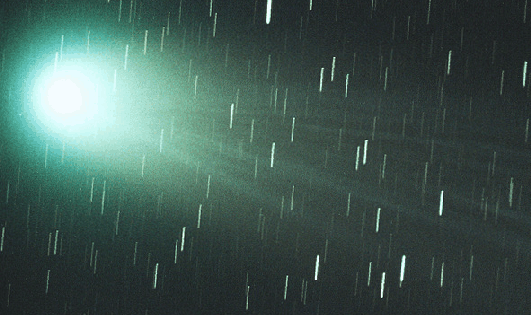 |
Астронет: Астрономическая картинка дня Ближайшее прохождение кометы Хиякутаке http://www.astronet.ru/db/msg/1161740/eng |
Credit & Copyright: Herman Mikuz,
Crni Vrh
Observatory, Slovenia
Explanation:
The above true color image of Comet Hyakutake was taken the night of
March 21/22.
Tonight, Comet Hyakutake will make its
nearest approach to Earth,
closing to a mere 10 million miles as it
passes over the planet's Northern Hemisphere.
From dark sky areas, it's tail
may be seen to cover about 20 degrees on the sky (40 times the apparent
diameter of the full moon) corresponding to well over 3 million miles.
at the distance of the comet.
The word comet, referring to the tail, derives from
the Greek "aster kometes", meaning
long-haired star - and
the hair of comet Hyakutake continues to grow as it nears the Sun!
The tail grows as the sun heats and sublimates
(changes directly from solid to gas) the material
on the icy surface of the comet nucleus,
sending jets of gas and dust into space. The material is swept
back by the solar wind, so comet tails usually point away
from the sun rather than simply trailing along behind in the
comets' orbit.
Some predict the tail will grow over the next few days
to nearly 50 degrees.
For the rest of
March and most of April Comet Hyakutake will be visible
to Northern viewers (weather permitting).
The tail will be most visible from
dark sky areas. Moonlit skies will tend to
washout the comet as the April 3rd full moon approaches -
however,
on April 3rd, there will be a lunar eclipse!
Latest Comet Hyakutake images:
Crni Vrh Observatory,
Slovenia,
Fayetteville
Observer-Times
Authors & editors:
Robert Nemiroff
(MTU) &
Jerry Bonnell
(USRA)
NASA Web Site Statements, Warnings,
and Disclaimers
NASA Official: Jay Norris.
Specific
rights apply.
A service of:
LHEA at
NASA /
GSFC
& Michigan Tech. U.
